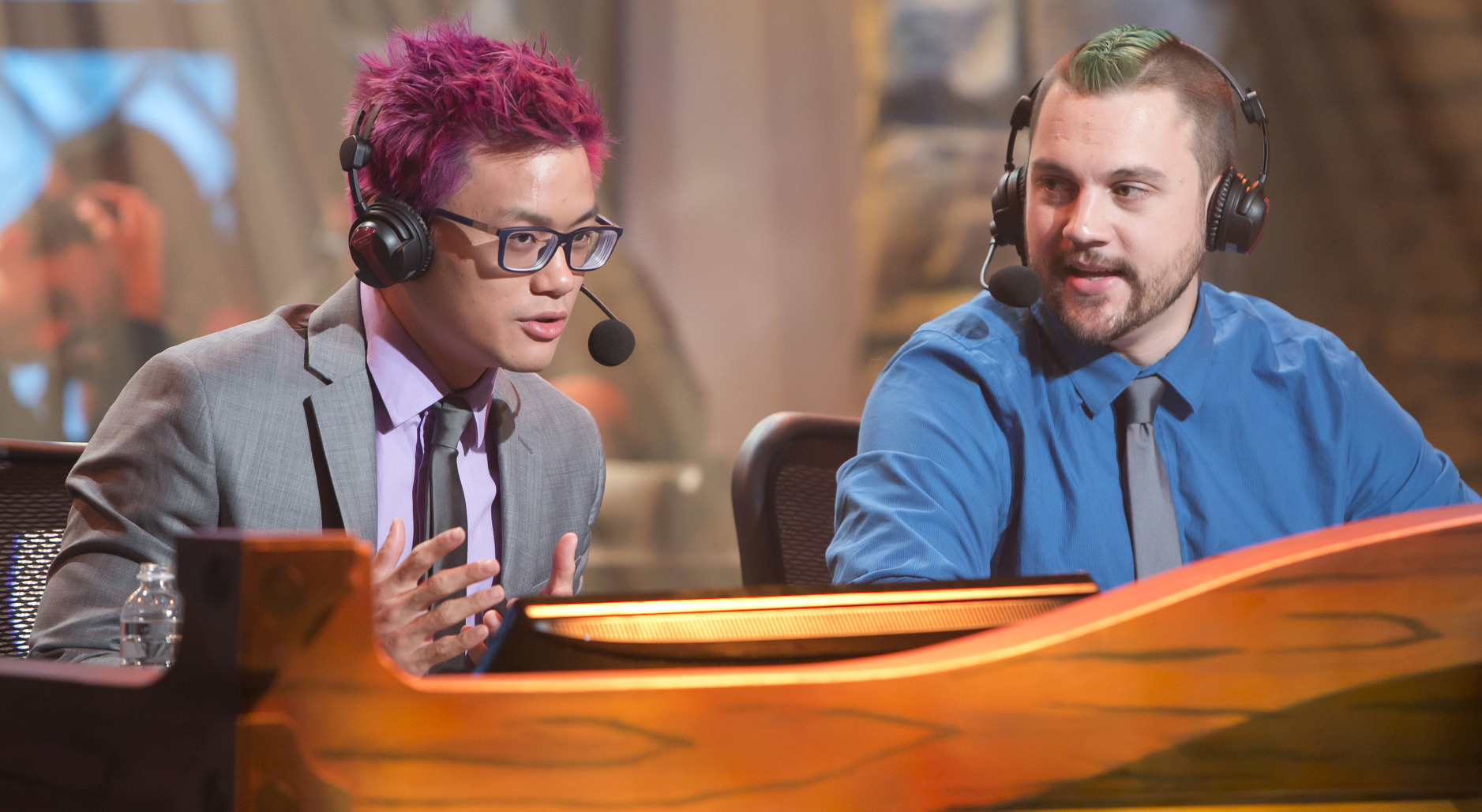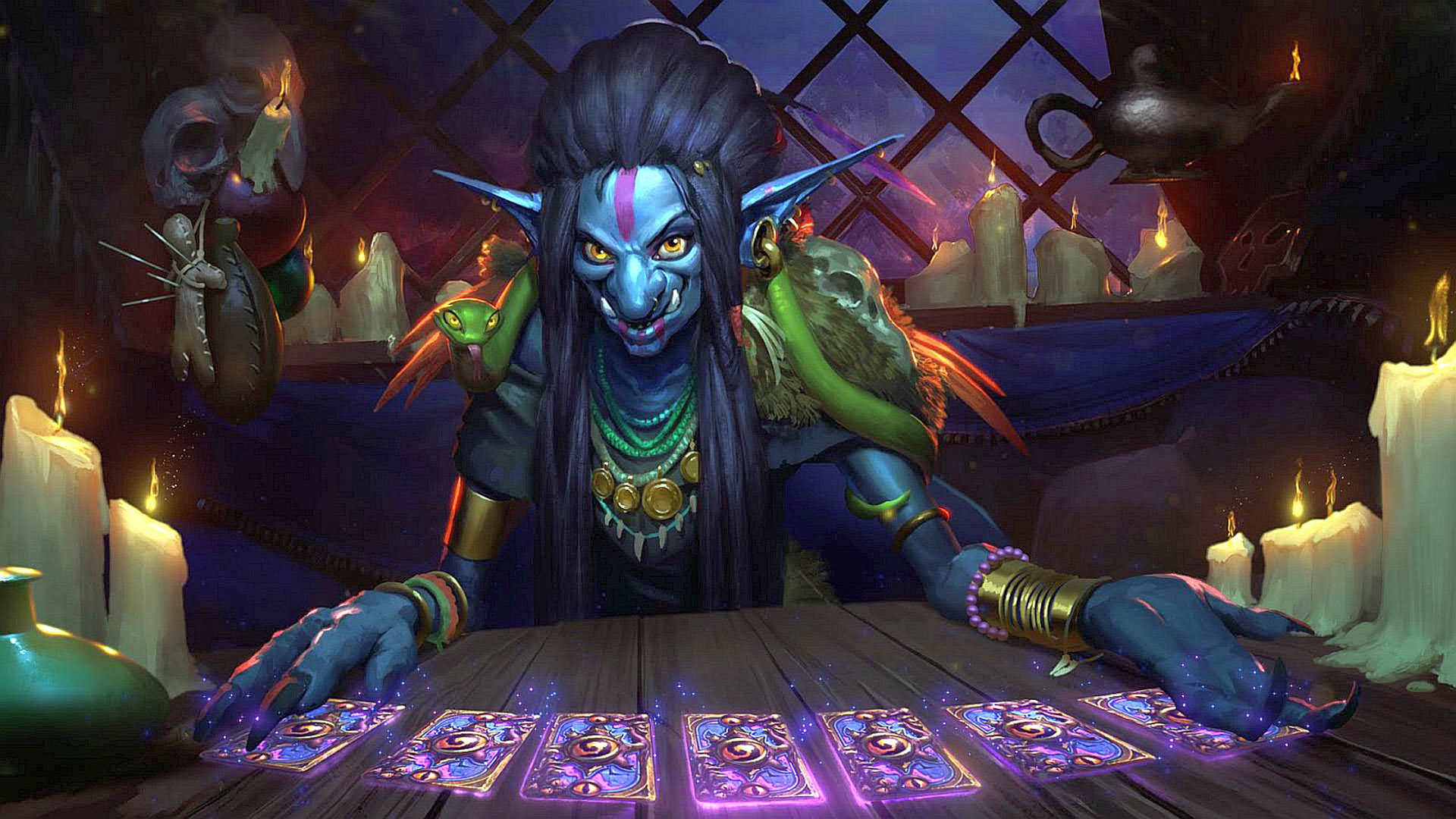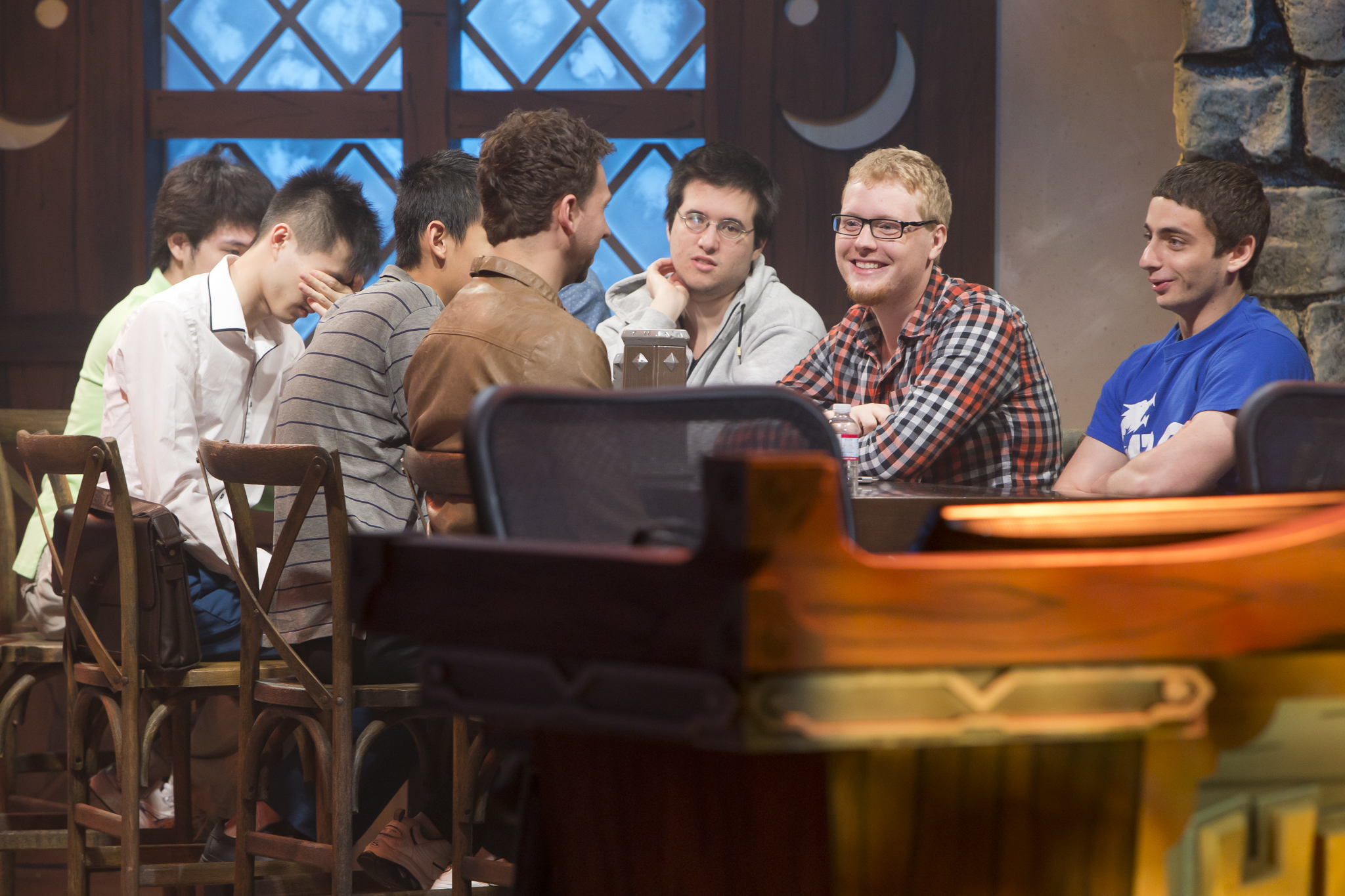
There’s a strange alchemy to what works in sports broadcasting. The right combination of talent sparking off each other can elevate otherwise average contests, whilst badly matched experts will do nothing but enrage the audience. And of course the same goes for esports. When it comes to Hearthstone casters, the chemistry between Dan “Frodan” Chou and TJ “Azumoqt” Sanders is pretty much peerless. The two are obviously good friends, often trying to out bad joke each other between plays, but never at the expense of quality analysis. (To get a sense of how serious Frodan is about his work, know that he recently published an unflinching article why Hearthstone casting needs to improve.)
Though they don’t tend to compete in high profile tournaments, both are also stronger players than casual viewers might imagine. TJ finished 25th on the NA ladder last month, using his mutant version of Zoo which runs Yogg, Bane of Doom and Spreading Madness. Frodan also finishes in the Legend rank every season, and today went 6-0 against StrifeCro and current world champion Ostkaka at Seat Story Cup, using the ultra slow Concede Shaman deck that uses Earth Elementals and Ancestral Spirit to run the opponent out of threats.
I spoke to the pair after the Americas Spring Championship last month to get a sense of how they feel about the game and where it’s going...
PC Gamer: How close do you guys feel the Whispers of the Old Gods meta is to being solved?
Dan “Frodan” Chou: Pretty close. I think that in every cycle of content you see three phases: the first is the discovery phase, which is learning what cards do, and you see people be the most bold because—in cards games specifically—everyone thinks they’re correct. The second phase is the first actual real establishment of what’s good and optimal. And then the third phase is countering that, and then of course settling from that point on. Right now we’re about to be in the peak of the third phase.
TJ "Azumoqt" Sanders: You can see it across all three [spring] championships. Each championship was a phase of what Dan just mentioned, and you could tell all the decks were sort of homogenized as you got to the Americas. So even just as far as going across the three championships, having all those matches publicized and having all the decklists published makes the meta get solved a lot faster too.
Frodan: I also think a large reason why is because we play a very limited number of formats, no pun intended. We only have Conquest or Last Hero Standing, so with these two formats people will try to maximize their type of plays. It just makes sense that it’s been figured out pretty quickly. It’s only been about a month and a half, or two months.
The biggest gaming news, reviews and hardware deals
Keep up to date with the most important stories and the best deals, as picked by the PC Gamer team.

PCG: Most of the players we’ve seen in the Americas tournament are, relatively speaking, unknown. I’m sure you guys have seen the article written by Shevek which was about whether casters and the media in general do a good enough job of promoting the stories around these sorts of guys. Do you think there’s going to be a permanent tension in Hearthstone between the fact that people like watching popular streamers play crazy decks, but the game doesn’t lend itself to those guys being consistent at tournaments?
Frodan: First of all, tournaments are never truly a good way to determine who’s the best, it’s just a fun source of competition. You look across any card game—and I’m not just comparing to poker, but every other card game—and there’s a very common saying that you have to be a masochist to enjoy competing in card games, because you just put yourself through this variance. So tournaments and streamers are just two different kinds of things. Two different kinds of content platforms. However, that being said, I do feel like right now we’re missing a lot. The first is that we’re missing the most competitive format possible. Before, the reason why Conquest existed is because it’s the closest thing that matched the casual experience. If you wanted to watch a tournament, you want it to be relatable to a certain degree. So if you have a very convoluted format, similar to picks and bans in Dota, it just gets so far from the degrees of separation that it’s cool, but it’s not exactly relatable.
"Tournaments are never truly a good way to determine who’s the best..."
Dan "Frodan" Chou
Because of the nature of Hearthstone and how popular some streamers are, it ends up becoming over-exposure. So you start to see the same decks all the time; for streams, for content, for highlight reels, for tournaments. And that makes the tournaments a lot less interesting, and that’s a sad thing because Hearthstone has thousands, if not millions, of potential combinations because of cards and deck slots. I personally feel like we’re very far away from where we want to be in terms of making it the most exciting product.
PCG: What do you think needs to be done?
Frodan: How long do you have? [laughs] There’s so many areas that can improve in Hearthstone. The first I think is actually starting to happen, which is completely opening it up and trying to make it as accessible as possible. Because that’s how the game continues to flourish, through an influx of constantly new players challenging the top, and that’s what really gets exciting. There’s supposed to be a huge grassroots and community movement in Hearthstone, but unfortunately because of the way the ecosystem was foundationally built, the excitement is based off the top streamers and content creators. It’s almost as if the entertainment is supposed to be driven from them, therefore it’s foundationally kind of incorrect. Hearthstone should be based off the fact that people love to play Hearthstone, but right now we emphasize all of our content as if people should love to watch Hearthstone, and I think that needs to fundamentally shift in order for people to start understanding where we need to be as a community.
PCG: Where do you think teams fit into Hearthstone now? You work with Tempo Storm obviously…
Frodan: It’s a very biased answer. [laughs]

PCG: But we’ve had Heathlytics leave the scene. Archon seems to be moving away from serious competition, although Amnesiac is still there...
Frodan: I think a large reason why is, again, the foundation that we’ve built Hearthstone upon is popular personalities, and that’s given them more power than teams. There’s no team league really—even if team leagues happen, they’re invitationals. So the incentive to build a cohesive unit that practices within itself and attends tournaments together is very low because you can just find your own practice partners, as seen from the championships. Almost none of these guys here in the top eight were sponsored. That doesn’t mean teams don’t work, it just means that people don’t know how to make teams work. I think people are finding out different business models every week. This industry keeps changing, everyone keeps thinking and finding the new big thing, so I think teams are very valuable in their own capacity as long as they find their own business model. Cloud 9 is very different from Tempo Storm which is very different from Archon which is very different from G2, and they all have their own ways to make their Hearthstone investments work.
"Part of what makes Hearthstone interesting fundamentally is just how much you can talk in the game."
Dan "Frodan" Chou
PCG: G2, Na’Vi, and Cloud 9 do seem like they’ve benefited from their players interacting with each other.
Frodan: That’s why I think the Redbull Team Brawl is actually something that, not only would I like to try to bring back, but I think it’s actually like the spiritual successor of Fight Night, which I think is really fun. Part of what makes Hearthstone interesting fundamentally is just how much you can talk in the game. That’s why streaming is so engaging, because you can always chat with people. They give you ideas in terms of whether you could’ve made a better play, or even better yet, you can make jokes. And that’s what Fight Night originally captured—it was just that dynamic of, not only could you talk to your other teammates, but you could trash talk the other team. I think we should definitely do something to support more teams in Hearthstone, unfortunately it’s not easy right now because, like we said, the ecosystem doesn’t necessarily support it directly.
TJ: Yeah, and all the unsponsored players already have established practice groups, and an established team doesn’t want to pick up a practice group. They don’t want to pick up four players. Then, if you want to pick up an individual player, would you pick up an individual player who might appear on a Blizzard stream to 50k viewers once every month, or would you pick up someone who streams five days a week in front of 10k viewers who doesn’t play at tournaments? So it’s really tough and I understand why big orgs don’t want to get into it, because I know a lot of these guys personally who want to join a team, but they’re like: “I’m not going to join a team unless you pick up him too,” so it becomes a little bit of an awkward situation.
On the next page: Card games that could challenge Hearthstone and the whether Yogg-Saron's RNG is good for the competitive game...
With over two decades covering videogames, Tim has been there from the beginning. In his case, that meant playing Elite in 'co-op' on a BBC Micro (one player uses the movement keys, the other shoots) until his parents finally caved and bought an Amstrad CPC 6128. These days, when not steering the good ship PC Gamer, Tim spends his time complaining that all Priest mains in Hearthstone are degenerates and raiding in Destiny 2. He's almost certainly doing one of these right now.


